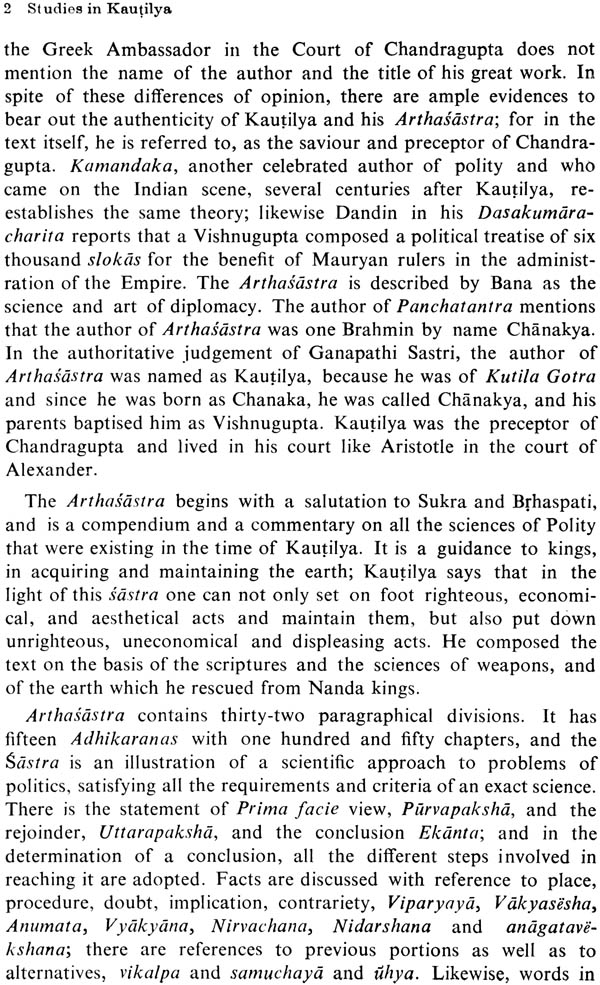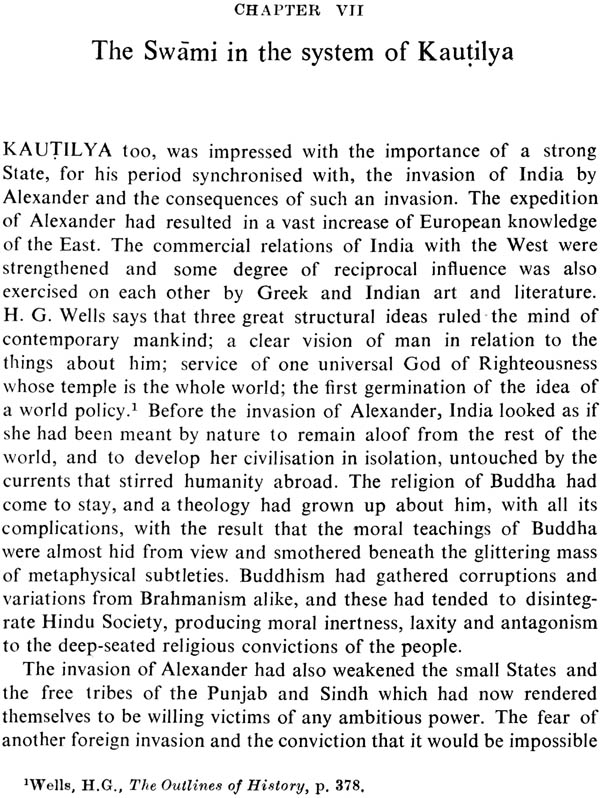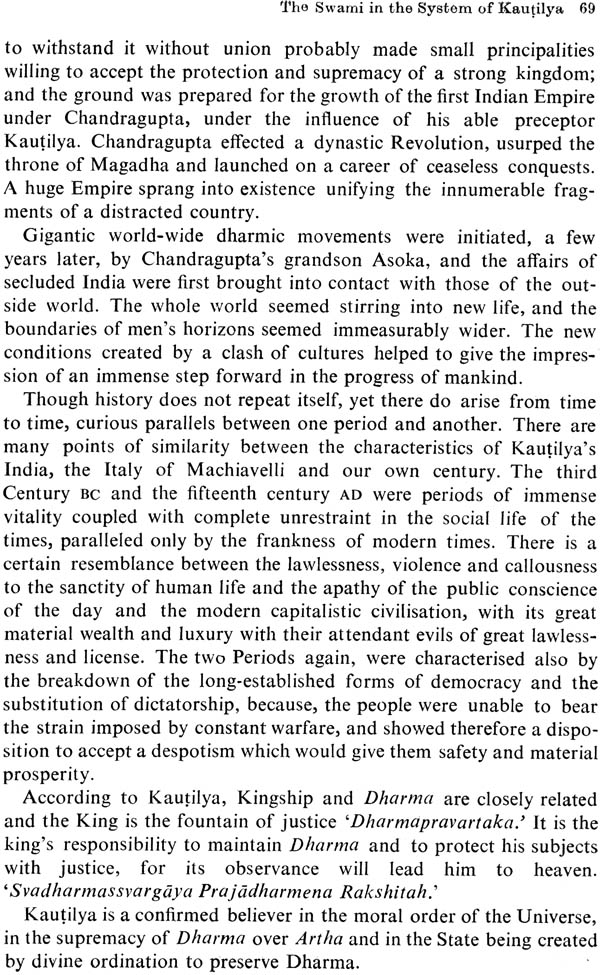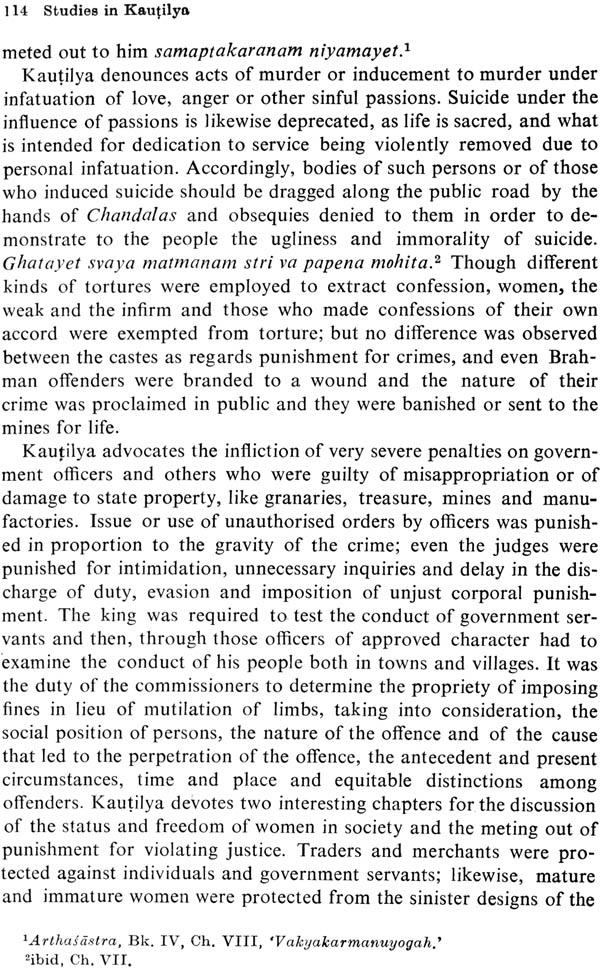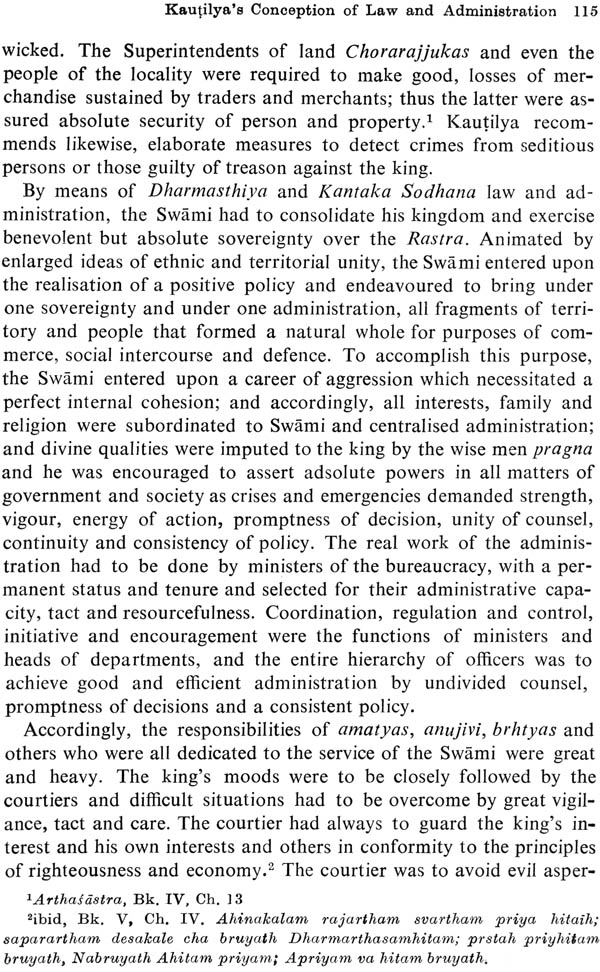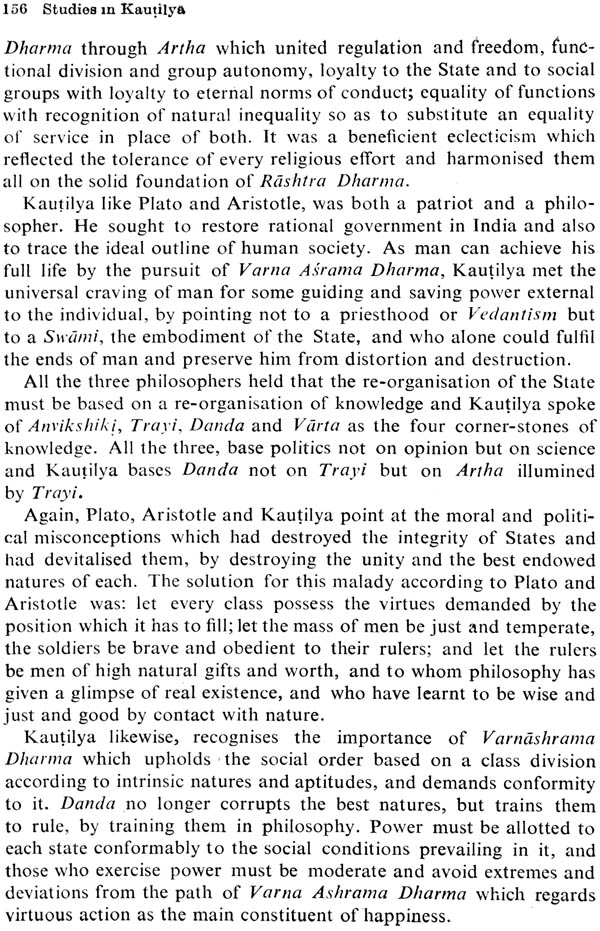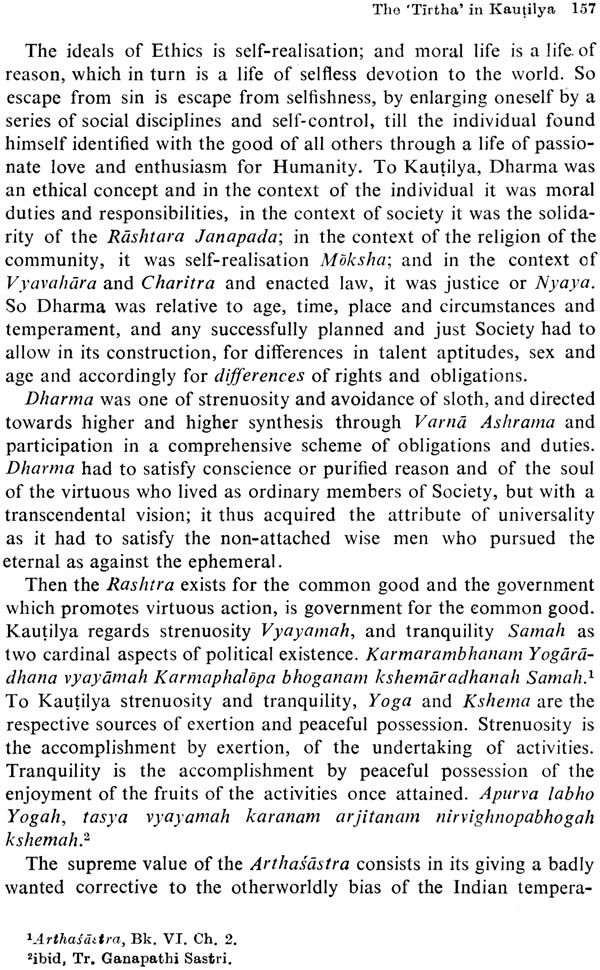
Studies in Kautilya
Book Specification
| Item Code: | IHD66 |
| Author: | M.V. Krishna Rao |
| Publisher: | MUNSHIRAM MANOHARLAL PUBLISHERS PVT LTD |
| Language: | English |
| Edition: | 1979 |
| Pages: | 179 |
| Cover: | Hardcover |
| Other Details | 8.8" X 5.8" |
| Weight | 360 gm |
Book Description
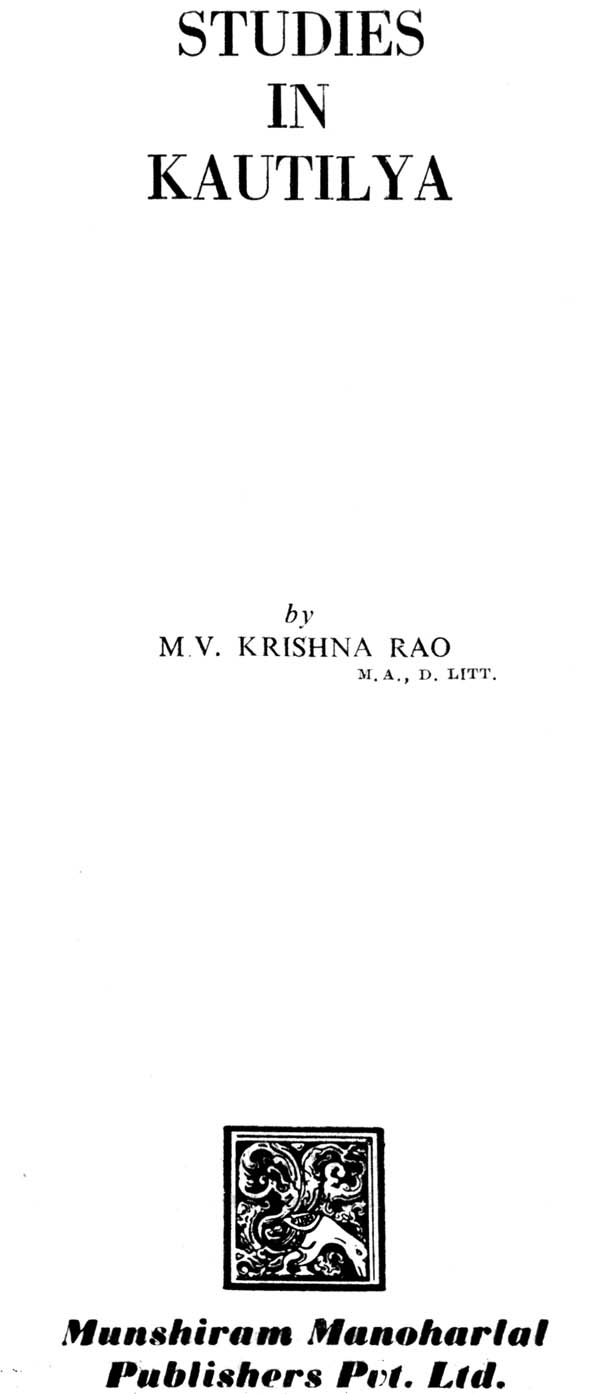
About The Book:
Dr. M. V. Krishna Rao's Studies in Kautilya is an objective and through examination of Kautilya's Arthasastrafrom the standpoint of his own age and society. Kautilya and Aristotle are found to have many identical views, which are opposed to Machiavelli's. Kautilya abhorred petty principalities and advocated a strong empire based on righteousness. The emergence of the Mauryan emprire, which comprises practically the whole of the Indian sub-continent, attests to the genius of Kautilya as a political theorist and practical statesman. Strict economy of expression, adherence to discussion and judicious selection of topics are the factors which bring into bold relief the various interesting aspects of the Arthasastra in a book of this small size.
Unlike most other writers on polity, Kautilya is unique in ancient Indian political thought, for he was both a thinker and a statesman; and he participated in the social and political revolutions of his Age, and abstracted from his study of the conflicts, tensions and emotions of the Age, certain general principles capable of universal application, and effective at all times and Ages.
There are certain venerable mis-conceptions about Kautilya and his statecraft. Certitude makes men so confident that their own views are right that they act upon the assumption that other views are wrong. They have the happy certainty that their own opinions are one with ultimate truth. The danger of this certitude is that it makes opposition unendurable to those who possess it. One such certitude has been to look upon Kautilya as a Machiavelli, as though Aristotle, Machiavelli and other European thinkers constitute the yard-stick for the measurement of political genius manifested in other parts of the world. This habit of certitude prevents the student of Kautilya from getting a correct picture of Kautilya's genius and the nature of his Arthasastra, for he is liable to become too conscious of its turbid side, or dreariIy oppressed with its interstatal diplomatic features. To see Kautilya in that Age and weigh him in his many aspects, one needs to go away from his Age and be, as it were, on a pinnacle here he can take it all with one sweeping glance. Modern outlook and the knowledge of the science of politics will help the researcher, then, to appreciate Kautilya's work in a manner which was unthinkable a couple of decades ago. Here is an attempt to describe Kautilya detached from the inherited prejudices and opinions that have often marred a dispassionate and correct presentation of his personality. Comparisons between Aristotle and Kautilya are made, not with the object to estimate Kautilya's contribution to political thought in terms of Aristotle, but to show how much there is in common between the two greatest political thinkers of Classical Antiquity.
The lectures delivered under the auspices of the Kautilya Mandali, Mysore, are gathered together in this Volume. The main objective of the Mandali, is to give the historical setting for significant Indian problems, to present the under-lying ideas involved in such problems, and to indicate trends or tendencies towards their solution, and thereby encourage the formation of correct judgments on matters of fundamental import.
Several parts of the first edition have been revised and a few more sections have been added in this Edition. Dr. Shama Sastri's translated edition of Kautilya's Arthasastra, Mahamahopadyaya Ganapati Sastri's Commentary in Sanskrit on the Arthasastra. Dr. V. R. Dikshitar's The War ill Ancient India and Sri K. V. Rangaswami Iyengar's Some aspects of Ancient Indian Polity have been very useful in the preparation of this volume, and I am under a deep debt of gratitude to them. I am thankful to my friends who inspired me to write this book and helped me with useful suggestions.
I desire to record my deep sense of gratitude to my publishers Messrs Munshiram Manoharlal, for undertaking this work, and for the courtesy, patience and promptitude displayed in the execution of the work in a very short time. There are omissions and perhaps shortcomings, and I take sale responsibility for them, and I beseech the reader to generously overlook the limitations of the volume.
| Preface | vii | |
| Chapter I | Introduction | 1 |
| Chapter II | The Date of Kautilya's and the Nature of his Genius | 10 |
| Chapter III | The Nature of Kautilya's Genius | 21 |
| Chapter IV | Kautilya's State is 'Pluralistically determined Monism' | 37 |
| Chapter V | Fundamental Aims | 51 |
| Chapter VI | "The Prince" in the Political System of Machiavelli and Kautilya | 56 |
| Chapter VII | The Swami in the System of Kautilya | 68 |
| Chapter VIII | The Principle of Omnipotence | 78 |
| Chapter IX | The Vijigishu: War and Diplomacy | 85 |
| Chapter X | Kautilya's Conception of Law and Administration | 108 |
| ChapterXI | Bureaucratic Government in the Arthasastra The System of State Aid Famine Policy Financial Administration | 118 119 124 126 |
| Chapter XII | Some Aspects of Arthasastra Society The Status of lower orders in Society Women in Arthasastra Society | 140 141 146 |
| Chapter XIII | The 'Tirtha' in Kautilya Bibliography Index | 151 159 163 |

